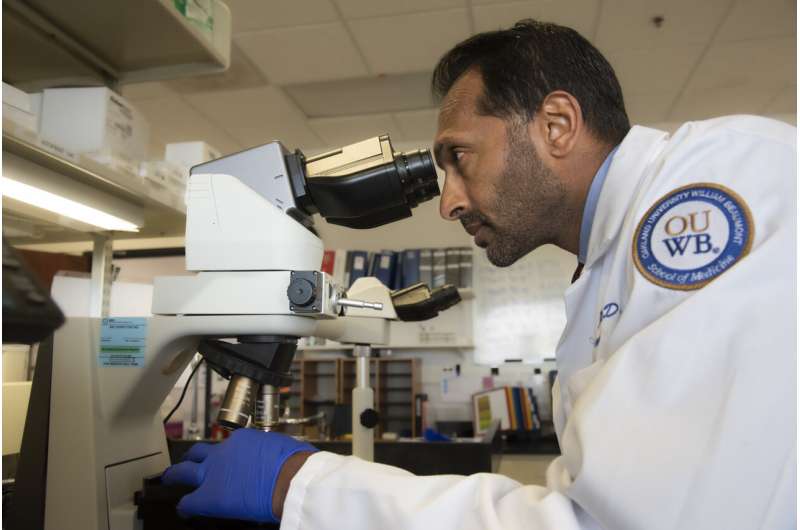This article has been reviewed according to Science X's editorial process and policies. Editors have highlighted the following attributes while ensuring the content's credibility:
fact-checked
peer-reviewed publication
proofread
New research may hold key to better treatments for aggressive brain cancer

For decades, researchers have marveled at the ability of glioblastoma, a particularly aggressive brain cancer, to turn off a patient's cancer-fighting immune cells, thereby allowing tumors to grow freely. This remains a primary reason why there are very few effective therapies available for this mostly fatal disease.
In a new study using more than 100 patient-derived glioblastoma tumors, Prakash Chinnaiyan, M.D., a physician scientist in the Department of Radiation Oncology at Corewell Health in Southeast, Mich., along with colleague and lead author Pravin Kesarwani, Ph.D., have discovered that a naturally produced chemical in the body is helping glioblastoma cells go unrecognized by a patient's own immune cells whose job it is to stop them.
"Specifically, we found that glioblastoma cells work with a patient's immune system to generate a chemical called quinolinate," Dr. Chinnaiyan said. "In turn, this chemical 'puts the brakes' on the surrounding immune cells and prevents them from attacking the tumor."
The findings, published in Nature Communications, could be the key to unlocking new and more successful treatments down the road. While there have been some immunotherapy drugs that have been successful in reactivating a patient's immune cells against certain cancers, none have worked on glioblastoma tumors and there are currently no available drugs to stop the production of quinolinate.
As a result, the team took their research one step further and created a genetically engineered mouse model that could no longer produce quinolinate.
"Tumors implanted in these mice grew significantly slower, and when analyzed in the lab, demonstrated robust immune activation, suggesting this pathway may serve as a new therapeutic target for glioblastoma," Dr. Chinnaiyan said. "This provides a framework to design new immunotherapies that can target quinolinate accumulation associated with this disease and possibly others."
As for next steps, Dr. Chinnaiyan said they will continue his research to help identify a compound that may be able to target quinolinate. The team also will look at extending their findings to other diseases such as Alzheimer's and Parkinson's where quinolinate accumulation has been found to be a potential factor as well.
"Our research may provide the key for better treatments and help save lives in the future, removing the mystery around glioblastoma and possibly other diseases," Dr. Chinnaiyan said.
More information: Pravin Kesarwani et al, Quinolinate promotes macrophage-induced immune tolerance in glioblastoma through the NMDAR/PPARγ signaling axis, Nature Communications (2023). DOI: 10.1038/s41467-023-37170-z



















